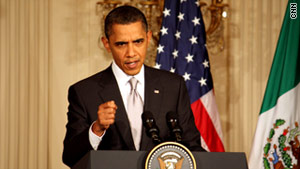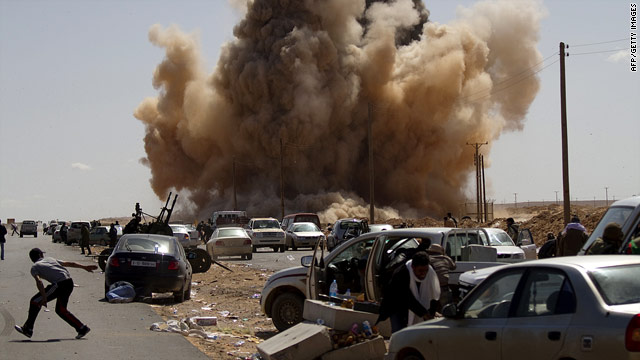
Ogoh-ogoh. Gianyar, Bali.
(Asia Sentinel) On the night before
Nyepi, the Balinese Day of Silence and the first day of the Balinese year, demons take to the streets
The full gallery of Balinese demons photographed by Robert Delfs can be found here:
Ogoh-ogoh Gallery (Flash – 24 images)
Anyone visiting Bali is impressed not just by the artistry of formal paintings and sculpture or the architecture of palaces and temples, but also by the beauty and design evident in the ritual practice and craft of daily life. It is an aesthetic determined by the special nature (and dangers) of dealing with an unseen world.
 |
| Balinese Hindu temple at Tanah Lot, Canggu, Bali. |
Balinese dance and drama articulate a world in which forces of good and evil are always inextricably intertwined, participants in an epic struggle that is never resolved, either in the realm of everyday appearances or in the world of spirits and invisible forms.
And what possible role could benevolent spirits have, were it not for the constant threats from the dark side?
Buta and
kala are everyday demons — the kind that are liable to inflict suffering on humans when they are offended or ignored. Their afflictions may also occur or when the benevolent spirits humans generally rely upon become, for whatever reasons, distant or alienated.
When bad things happen to good people, the Balinese instinctively wonder which ritual observance was omitted. What spirit could have been so offended that such a disaster could happen? What usually benevolent being who usually can be counted on has withdrawn his or her support?
Keeping the denizens of the spirit world is a constant preoccupation in Balinese Hinduism. The costs of staying on the spirits’ good side, however, can add up to a significant drain on household budgets. The fees that must be paid to Brahman priests to conduct necessary rituals and sacrifices are not trivial. But most believe that neglecting the gods or skimping on offerings would be a false economy which could only lead to peril for themselves and their families.
It isn’t just a matter of providing good deities with appropriate offerings, rituals and dance. Evil spirits known to be dangerous must also be propitiated with their own special offerings and rituals as well. Sometimes, however, it is necessary to find some means to drive them or frighten them away.
Buta, which often figure into older traditional Balinese paintings, are typically represented as distorted or broken humans, often with missing or misplaced body parts — for example the head may be located below the groin — or in the same way as kala, with exaggerated human characteristics and "uncontrollable passions and hungers, especially greed and anger, represented by fangs, bulging eyes, and pot-bellies." (1) These beings are normally invisible, but for the Balinese, these horrific creatures are always all about.
The demonic aspect of Balinese dealings with the spirit world reaches its fullest expression on the day of the new (dark) moon of the spring equinox, the day before Nyepi, the Balinese Day of Silence and the first day of the Balinese year, which occurred last Saturday.
Nyepi is a day of quiet meditation and reflection. For 24 hours, almost all Balinese observe
Tapa Berata Penyepian, or the "four restrictions" of no fire (or light), no work, no travel, and no indulgence in pleasure or entertainment.
A gentler regime is imposed on non-Hindus and non-Balinese. Bali’s international airport, ports and ferry terminals are closed for 24 hours over Nyepi. Patrolling wardens keep the streets empty of all traffic except ambulances responding to life-threatening emergencies or childbirths. All are required to remain inside their homes for the entire day. Tourists staying at hotels may conduct themselves more or less as they please, but are not allowed to leave the grounds of their hotels. No musical performances or other loud activities are permitted.
On February 28, Bali Governor I Made Mangku Pastika urged Balinese to use the occasion of Nyepi for introspection and self-examination so as to "to refine the soul full of passion and desire". A former head of the regional police, Governor Pastika established an international reputation when he headed the successful investigation, arrests and convictions after the terrorist bombings in Bali by members of the hardline militant group Jemaah Islamiah in October 2002.
"From Bali, religious harmony can be transmitted to the [other] affected areas in Indonesia so as to realize a peaceful and prosperous serenity," Pastika said, noting that members of the international community and non-Hindu people in Bali have great respect for Hindus who perform Tapa Berata Penyepian.(2)
 |
| Ogoh-ogoh, Gianyar, Bali |
But the governor also warned against allowing pre-Nyepi ritual processions and festivities to degenerate into unrest.
"Do not let the parade of
ogoh-ogoh carried by youths develop into conflicts or seeking revenge among citizens of different
banjar (3)," the governor said. Such incidents are rare, but can occasionally occur when inter-banjar rivalries and resentments get out of hand.
On the evening of the day before Nyepi, people all over Bali engage in noisy exorcism rites to drive away the buta and kala, starting in their homes and proceeding to join together at crossroads in villages and towns. Led by Brahman priests and accompanied by gamelan orchestras, people carry torches and beat drums and gongs, shouting "Get out" to the demons.
Ogoh-ogoh are larger-than-life-size effigies of demons and monsters. Mounted on racks lashed together from bamboo poles, the ogoh-ogoh are carried by groups of young men in processions through the streets to the crossroads where they meet ogoh-ogoh carried by youths from other banjar, while other people shout, throw firecrackers, and fire noisemakers that resemble small cannons.
 |
| Young boys working on their ogoh-ogoh. (The bicycle spokes are made from soda straws; the chain from a long string of purple beads. |
For weeks before the event, (mostly) young men and boys all over Bali have been feverishly engaged in constructing the ogoh-ogoh, while older and more prosperous banjar members contribute small sums to pay for materials. Most ogoh-ogoh are constructed from bamboo and paper-mâché, but nowadays some are assembled from sculpted blocks of polystyrene foam or other materials, the painted and decorated or clothed. It is worth stressing that the young men and boys who create these incredible objects are, in most cases, not professional artists; they are residents of the same village, or neighbors in the major city of Denpasar or other towns.

|
| Jero Luh, Consort of the Fanged Lord. |
In recent years, ogoh-ogoh artists have also become more creative and innovative in their choice of subject matter. Classic ogoh-ogoh are designed to resemble specific evil spirits and demons, the most important of which are
Jero Gede Mecaling, the "Fanged Lord", who dwells in the Temple of Ped on the nearby island of Nusa Penida with his grotesquely lascivious, long-tonged consort Jero Luh (who can be easily recognized as she is usually dressed in white). It is the Fanged Lord and his evil subjects who are considered responsible for bringing illness, disorder and calamity to Bali, particularly during the rainy season over the last three months of the Balinese year before Nyepi.
Even with such standard subjects, however, there is a bewildering variety of styles and approaches.

|
| She's read Elizabeth Gilbert's book "Eat, Pray, Love" |
But there also also ogoh-ogoh which express social and political themes. Some are models of living figures — and here it should be noted that becoming the model for an ogoh-ogoh is not generally considered a sign of admiration or respect. And some ogoh-ogoh also represent characters of interest who have influenced life on Bali, such as foreign tourists, hippie surfers, or westernized Indonesian youths.
Gayus Tambunan is the subject depicted by numerous ogoh-ogoh in Bali this year. Tambunan is an Indonesian tax official who was recently sentenced to prison for seven years on charges of bribery and corruption, including bribing his way out of some earlier bribery charges. The fact that he managed to travel to Singapore, Kuala Lumpur, Macao and Bali (to attend the Commonwealth Tennis Tournament) last year when he was supposed to under detention at a Jakarta jail has badly embarrassed the Indonesian government.

|
| Ogoh-ogoh depicting disgraced tax official Gayus Tambunan and a policeman |
But even more embarrassing were Gayus’ revelations that other senior tax officials and high-ranking police officers conspired to help major Indonesian companies evade taxes and/or avoid penalties for tax offenses, at an estimated cost to the Indonesian Treasury of Rp 1.52 trillion (US$171.8 million). Investigations into the full ramifications of the case continue. (The ogoh-ogoh shown above depicts Gayus wearing the long-haired wig he used when travelling abroad and to Bali using a false passport. Note the (real) money stuck into his waistband and held in one hand of the running policeman.

|
| Another ogoh-ogoh representing Gayus Tambunan. Not much of a resemblance, but the point is clear enough. |
The pre-Nyepi exorcism ceremonies concluded with the ogoh-ogoh being borne back to the banjar temples where they were made, to be burned in bonfires, though nowadays a few ogoh-ogoh are given a brief extension of life to remain at the banjar temples for a few weeks.
After the ogoh-ogoh have gone up in smoke, it is time to return home to clean house and also to prepare food in advance for the next day. At 6 am, Bali’s Day of Silence begins.
Notes
1. Margaret J. Wiener, Visible and Invisible Realms: Power, Magic and Colonial Conquest in Bali, University of Chicago Press (1995), pp. 52-54. See also Clifford Geertz, Negara: The Theater State in Nineteenth Century Bali, Princeton University Press (1980).
2. Hendra Rayana, "The Governor expects this year’s Nyepi to be enable Balinese to refine their souls’ desires", Bali Post (28 February 2011)
3. Banjar are autonomous village and neighborhood organizations which combine local administration, social and religious functions. Typically comprising 50 to 250 households with male heads of households representing each family, the banjar leaders adjudicate issues of adat (traditional) law, handle disputes and exercise local decision-making powers. See Robert Pringle, A Short History of Bali: Indonesia’s Hindu Realm, Allen & Unwin (2004).
Ogoh-ogoh Gallery (Flash – 24 images)







 (Asia Sentinel) One state agency tries to get people to quit while another tries to get them to smoke
(Asia Sentinel) One state agency tries to get people to quit while another tries to get them to smoke

 Tripoli, Libya (CNN) -- Libyan leader Moammar Gadhafi took aim at the rebel-controlled town of Ras Lanuf on Monday, launching aerial strikes as part of an assault aimed at crushing the uprising against him.
Tripoli, Libya (CNN) -- Libyan leader Moammar Gadhafi took aim at the rebel-controlled town of Ras Lanuf on Monday, launching aerial strikes as part of an assault aimed at crushing the uprising against him.![photos1_thumb[1] photos1_thumb[1]](http://www.hrp-my.org/wp-content/uploads/2011/03/photos1_thumb1_thumb.jpg)
















